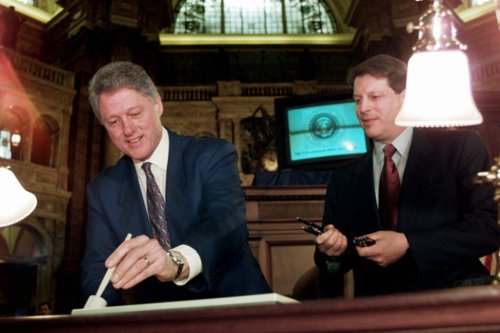 Radio is a business.
Radio is a business.
Peter Drucker said the purpose of a business is to create a customer.
For radio, that means creating two types of customers: 1) a listener and 2) an advertiser and when done correctly, a radio station makes a profit.
Making Money
For most of my radio career, radio enjoyed a revenue expansion that rivaled the infamous “internet bubble.” Owning a radio station was considered a license to print money. Bottom lines often delivered a profit of 25 to 50% or more, so, while those profits were noticed by Wall Street investors the ownership limits on radio stations kept them away. Investors were frustrated that there was no way to scale up the size of a radio broadcast company.
Telcom Act of 1996
Then President Bill Clinton signed the Telecommunications Act of 1996. It relaxed radio’s ownership rules making it possible for one company to own multiple radio stations in a single market.
Wall Street loved the change! The money poured in from eager investors, and companies like Clear Channel, Citadel, and Cumulus quickly bought as many stations as they could using other people’s money. Mom & Pop radio operations had multiple companies vying for their properties and radio station values soared.
Ownership Limits
In 1953, the Federal Communications Commission (FCC) adopted its so-called 7-7-7 rule to encourage diversity of broadcast ownership. In essence, no single owner could own more than 7 AM radio stations, 7 FM radio stations, and 7 television stations in the entire United States of America.
By July of 1984, the FCC said they sought to encourage media competition and increased the number of radio and television stations a single owner could control to 12-12-12. The FCC Chairman was Mark S. Fowler. The President of the United States was Ronald Reagan. The five member FCC was 3 Republican appointees and 2 Democratic appointees. The vote to expand the ownership limits was 4 to 1 in favor.
“Bigness is not necessarily badness,” Chairman Fowler is reported saying. “Sometimes it is goodness.”
The New York Times reported reaction on Capitol Hill to the expansion of ownership limits this way:
On Capitol Hill, there was mixed reaction to the plan to abandon all limits on broadcasting ownership in 1990, although sentiment has grown in recent years for raising the ownership maximum somewhat.
Representative Timothy E. Wirth, the Colorado Democrat who is chairman of the House telecommunications subcommittee, said, ”The 12-12- 12 rule is just as arbitrary as the 7-7-7 rule.”
Mr. Wirth said a broad bipartisan consensus in Congress favors adoption of ”objective, long-term rules that assure diversity and competition.” He said such rules would provide for increased broadcast ownership but would not completely deregulate it.”
He went to say “If they deregulate in 1990, we could end up with a handful of companies owning every broadcasting outlet in the country.”
President Ronald Reagan
Reagan loved two things, cutting taxes and eliminating regulation. Remember Reagan famously said that “Government isn’t the solution to our problems, government is the problem.” Reagan’s pick for FCC Chairman, Mark Fowler, fully embraced this vision and actively applied it to the FCC.
However, the prediction of Congressman Timothy Wirth wouldn’t come into existence until President Bill Clinton signed the Telecommunications Act of 1996. It would be the first significant overhaul of the 1934 Act in more than sixty years.
Radio station ownership in the first five years under this new act went from 5,100 owners to 3,800.
Instead of opening up ownership to new and more diverse ownership, it created an opportunity for media monopoly. The Wall Street funded radio companies could now buy out the Mom & Pops and the temptation to sell at never-before-seen-multiples was too good to pass up.
Operating in the Public Interest, Convenience and Necessity
When no one really knew what radio broadcasting would become, they did know they wanted radio to be a communications business that would serve its community of license for convenience in good times and of necessity in times of trouble. The airwaves were considered to be owned by the public, so operating in their best interests was a requirement to being an FCC broadcast licensee.
Changing Competitive Landscape
Historically, radio stations competed against one another. Most markets had such battles as, WLS vs. WCFL, WMEX vs. WRKO, WPTR vs. WTRY, KHJ vs. KRLA etc. When FM radio began to take over from AM, a station such as WABC no longer had just WMCA to beat, but now WTKU-FM too, which offered better fidelity and stereo. This new radio competition replicated in every radio market in America.
Then came Satellite Radio, followed by Pandora along with other pureplay streamers, and podcasts so that today, the radio competition landscape lines are blurred beyond recognition.
Mission vs. Platform
Today’s communications company needs to clearly define its mission and needs to earn the trust of all of its stakeholders. That means building trust between its employees, advertisers and listeners.
We need to stop thinking of “radio” as AM or FM.
We need to think of radio as being the audio leader for creating an environment for convening and supporting groups. We need to be preparing for a future that is still coming into focus.

 Kansas City Filmmaker
Kansas City Filmmaker  It was supposed to provide competition between the phone companies and the cable companies with the goal to increase services and reduce prices to the consumer.
It was supposed to provide competition between the phone companies and the cable companies with the goal to increase services and reduce prices to the consumer. Today is a milestone of sorts for me. It marks my 100th blog post since beginning my blog. Also notable since my blog has long passed the threshold of four months, the period of time most new bloggers quit blogging.
Today is a milestone of sorts for me. It marks my 100th blog post since beginning my blog. Also notable since my blog has long passed the threshold of four months, the period of time most new bloggers quit blogging.